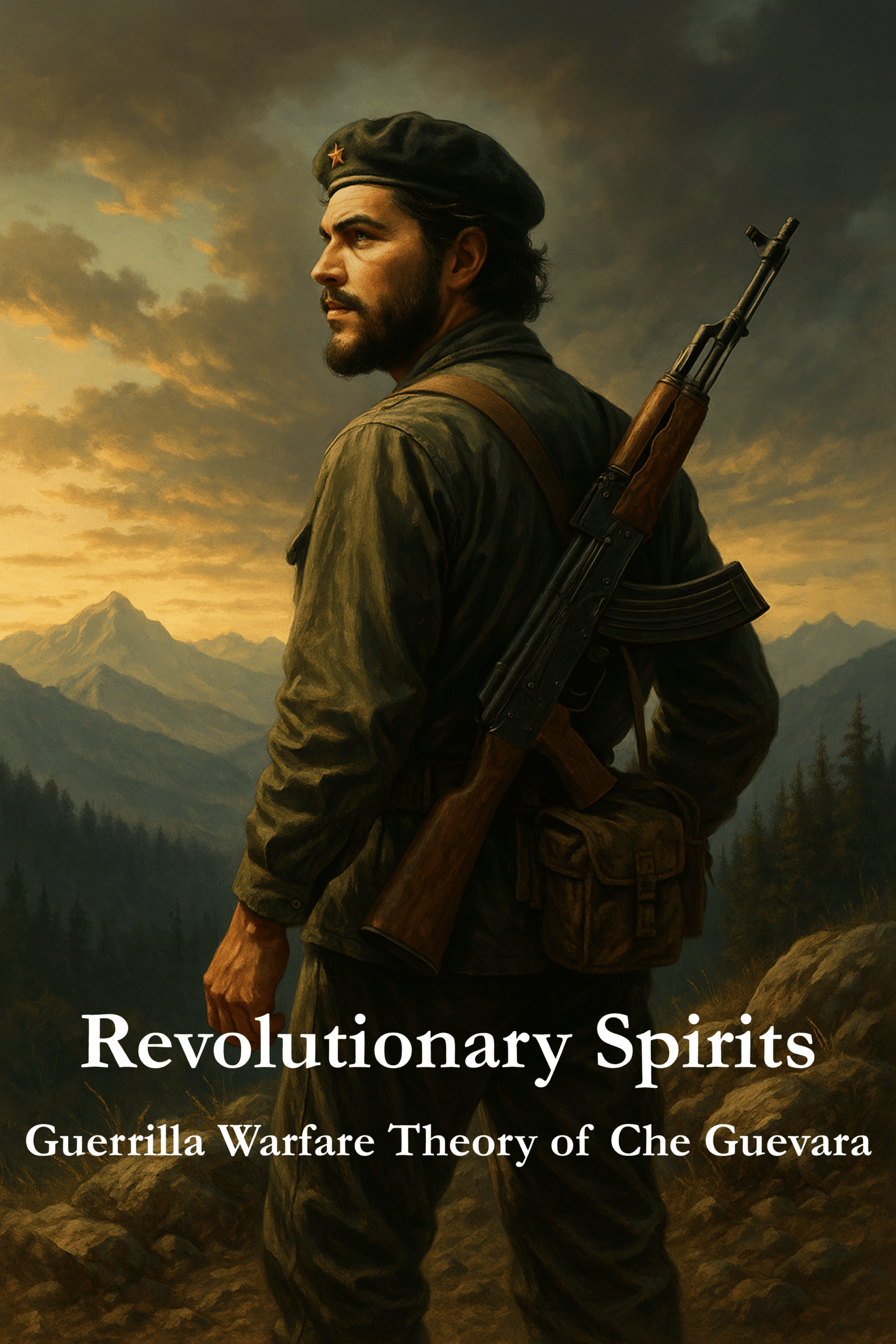What remains of Che Guevara’s theory of revolution in the 21st century? In an era shaped by cyber conflict, proxy insurgencies, and state surveillance, a return to Guevara’s foundational ideas might seem anachronistic—or surprisingly prescient. A new title released this week by Distillery Press, Revolutionary Spirits: Guerrilla Warfare Theory of Che Guevara, invites readers to revisit Guevara’s doctrine. It approaches the topic as a structured case study in asymmetric warfare, not through the lens of nostalgia or ideology.
Based on extensive primary-source analysis and now cleared for public release by the U.S. Department of Defense, Revolutionary Spirits offers a doctrinal breakdown of Guevara’s approach to guerrilla conflict. It traces its ideological roots, battlefield execution, and enduring global influence. Rather than romanticizing rebellion, the book presents a sober, academically grounded assessment. This reveals how Guevara’s ideas fared under real-world conditions.
A Theoretical Framework Built for Action
At the heart of Guevara’s doctrine lies foco theory, the belief that a small, committed guerrilla force can act as the catalyst for widespread revolution. This vanguard model assumes that political consciousness will follow armed action, rather than precede it. Inspired by his experiences in the Cuban Revolution, Guevara proposed that the conditions for rebellion could be created rather than waiting for them. Particularly in rural, underdeveloped societies facing authoritarian rule or foreign-backed regimes.
The book begins with a foundational chapter on Guevara’s political ideology, grounded in Marxist-Leninist thought and shaped by Cold War dynamics. It shows how Guevara adapted traditional Marxist class analysis to the Latin American context, where the urban proletariat was often less politically mobilized than rural peasants. This pivot laid the groundwork for a rural-centric revolution. It was contrary to prevailing orthodoxies.
Beyond Cuba: Exporting the Foco
While Guevara’s role in the Cuban Revolution is well-known, Revolutionary Spirits pushes beyond this origin story to trace his attempts to export guerrilla warfare abroad—most notably in the Congo and Bolivia. These campaigns form the empirical spine of the book’s analysis. Each receives a chapter-length treatment, dissecting Guevara’s assumptions about terrain, local support, external logistics, and the replicability of Cuban conditions.
In the Congo, Guevara encountered ethnic fragmentation, poor discipline among local fighters, and limited ideological commitment. In Bolivia, his force faced language barriers, cultural disconnection from the local peasantry, and an increasingly effective counterinsurgency response. These failures, rather than being brushed aside, are presented in detail. The book underscores how idealistic assumptions about revolutionary universality often collided with the reality of regional dynamics and population behavior.
Comparative Doctrines: Mao, Lawrence, and the Limits of the Vanguard
One of the book’s key contributions lies in its comparative treatment of insurgency doctrine. It contrasts Guevara’s focus on armed action with Mao Zedong’s more patient model of protracted war, which emphasized political groundwork, mass mobilization, and a disciplined party structure. Where Guevara saw violence as the engine of revolution, Mao saw it as the culmination of a longer political process.
The text also examines T.E. Lawrence’s tribal warfare campaigns during the Arab Revolt as a historical counterpoint. Lawrence’s emphasis on indirect strategy, tribal autonomy, and environmental adaptation offers another lens through which to view Guevara’s attempts. These comparisons help clarify the unique (and sometimes contradictory) nature of Guevara’s thinking: tactical improvisation underpinned by rigid ideological belief.
The Machinery of Guerrilla War
Beyond theory, Revolutionary Spirits explores the operational toolkit Guevara sought to employ. Each chapter breaks down a functional component of guerrilla warfare: logistics, terrain, morale, propaganda, medical care, communications, and sabotage. These are treated not as abstractions, but as concrete systems requiring planning, improvisation, and sustained adaptation under fire.
The book gives particular attention to the psychological and moral dimensions of guerrilla life. It documents how Guevara cultivated what he considered “revolutionary virtue” within his fighters—instilling discipline, sacrifice, and commitment to a broader cause. Yet it also chronicles the frictions this generated, especially in campaigns where ideological commitment was weak or coerced. Rather than glorifying or condemning these efforts, the book treats them as essential to understanding insurgency from within.
Che Guevara in the Modern Strategic Environment
In its final chapters, Revolutionary Spirits shifts its lens forward. How do Guevara’s ideas stand up in a world of drones, facial recognition, and proxy warfare? Can a rural vanguard still spark revolution in an age of data-driven targeting and population-centric counterinsurgency? The book suggests that while the specific tactics of Guevara’s model may be obsolete, some of its principles—adaptability, strategic initiative, and the cultivation of symbolic narratives—continue to echo in contemporary resistance movements.
From Latin America to Southeast Asia, Guevara’s writings still influence insurgent doctrine, even if often selectively and filtered through new political ideologies. His image remains iconic, but the ideas behind it are less commonly examined in depth. This book attempts to correct that.
Who Should Read Revolutionary Spirits?
This is not a memoir or a manifesto. It is a structured academic monograph designed for:
- Military professionals involved in irregular warfare strategy, information operations, or counterinsurgency planning.
- Historians and conflict analysts seeking a comparative approach to 20th-century revolutionary theory.
- Educators and students looking for case studies grounded in real-world outcomes rather than ideological frameworks.
- General readers curious about what lies beneath the pop-culture iconography of Che Guevara.
Crucially, the book avoids advocacy. It neither calls for revolution nor justifies Guevara’s methods. Instead, it treats his doctrine as a serious—if flawed—attempt to codify irregular warfare, worthy of close study alongside better-known military theorists.
From Inspiration to Isolation: Lessons from the Field
Ultimately, Revolutionary Spirits is a study in the tension between idealism and execution. Guevara’s vision of rapid, self-igniting revolution rarely held up against the stubborn facts of geography, demography, and state resilience. His belief in the universal applicability of the guerrilla model often led to strategic isolation. Yet the same doctrine also inspired dozens of movements. It helped reframe how small wars were fought and contributed to the global vocabulary of insurgency.
As wars increasingly shift away from conventional theaters and into the gray zones of occupation, resistance, and asymmetric attrition, the study of irregular warfare is once again central. Che Guevara’s model may not be a roadmap for modern revolutionaries, but it remains a revealing artifact of insurgent thought. One that continues to inform debates over power, legitimacy, and the means of struggle.
Revolutionary Spirits challenges readers not to agree or disagree, but to understand. In doing so, it reopens a critical conversation about what it means to fight from the margins—and what happens when theory meets terrain.
View the full list of titles in the Masters of Resistance series.

